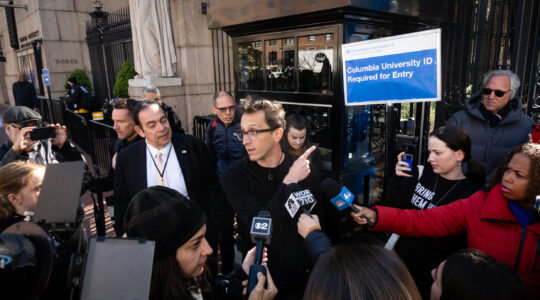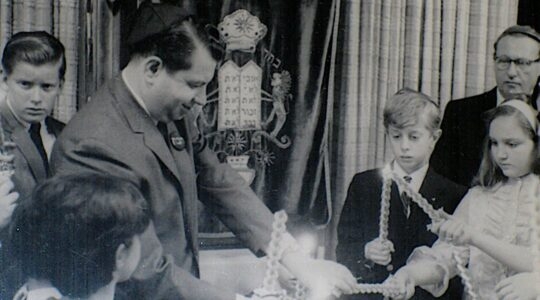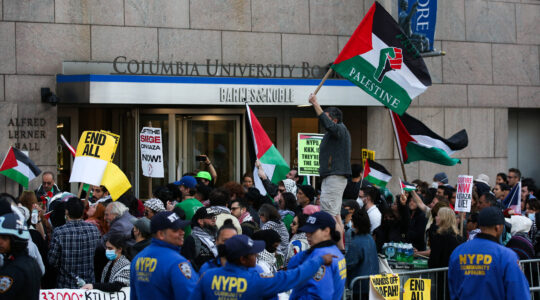Washington, D.C. — When Amy Friedkin, former chair of the AIPAC board, introduced herself to the AIPAC Policy Conference here this week as a Democrat, she received faint applause from the approximately 18,000 attendees.
When Alan Franco, a current AIPAC board member, introduced himself as a Republican, the cheering grew louder.
And so began an AIPAC conference filled with appeals to bipartisanship that alternated with plainly partisan speeches, mostly attacking Democrats.
From the moment the three-day conference of the powerful pro-Israel lobby began on Sunday with a request for participants not to cheer for partisan attacks and to grant their applause as a reward for bipartisanship instead, the increasing shakiness of AIPAC’s bipartisan foundations was apparent. Even before Sen. Bernie Sanders, the current frontrunner for the Democratic presidential nomination, went so far as to accuse the lobby of offering a platform to “bigotry,” the event was shaping up as a political lightning rod.
The decision by all the Democratic candidates for president, save for Mike Bloomberg, to skip the conference was put under close scrutiny, even though it happened to coincide with the run-up to this week’s pivotal Super Tuesday primary contest in 14 states.
With the Democratic primary field winnowing down and Bernie Sanders emerging as the candidate to beat, AIPACers expressed fear of a potential nominee who has called Israeli Prime Minister Benjamin Netanyahu a “racist” and spoken of leveraging U.S. aid to Israel to bring both sides of the Israeli-Palestinian conflict to the table.
The U.S. aid package is sacrosanct to AIPAC, which has long touted support for it and Israel’s other security needs; the organization maintains that the aid package draws wide and deep backing from both sides of the aisle. And while the conference still drew a parade of Republicans and Democrats, a lobby that often enthusiastically defends a right-wing Israeli government is deeply concerned by criticism from the Democrats’ progressive wing.
During plenary sessions at the Walter E. Washington Convention Center, Sanders was the Democratic figure invoked again and again by speakers.
In an opening speech on Sunday morning, Howard Kohr, AIPAC’s CEO, seemed to place the blame for degrading bipartisanship on Democrats, and specifically the Bernie Sanders wing of the party. “Today, I must sound an alarm,” said Kohr, appearing to speak about Sanders. “A growing, highly vocal and energized part of the electorate fundamentally rejects the value of the U.S.-Israel alliance. It is no longer on the margins — but instead has taken the spotlight of our political life. Its most radical views are bending the political conversation and commanding attention. And this movement has national ambitions.”
AIPAC’s new president, Betsy Berns Korn, echoed Kohr in her inaugural address to the conference. “We need to see this moment for what it is. We’re in a fight,” she said. Korn warned AIPAC’s adversaries that the lobby will not hesitate to deploy its resources to fight them. “Our friends in Congress — Democrats and Republicans — must know that members of the pro-Israel community will help them,” said Korn. “And those who stand against the U.S.-Israel relationship must know: The pro-Israel community will work to defeat them.”
Korn’s threat comes after Democratic Majority For Israel, a pro-Israel PAC ideologically aligned to AIPAC, ran ads attacking Sanders in Iowa and Nevada leading up to those states’ primaries.
AIPAC ran advertisements on Facebook just a few weeks before the conference targeting some Democrats and calling them “maybe more sinister” than ISIS and other terrorist groups. The lobby was criticized for running the ads and quickly apologized and removed them, but the episode fueled outrage at AIPAC among some Democrats.
Support the New York Jewish Week
Our nonprofit newsroom depends on readers like you. Make a donation now to support independent Jewish journalism in New York.
When it came to speeches from members of the Trump administration at the conference, the attacks on Democrats were more wide-ranging and less veiled. Speaking on Monday morning, Vice President Mike Pence made an explicit appeal to re-elect Donald Trump and denigrated the Democratic candidates for president. “When Bernie Sanders smeared Israel at last week’s debate, not a single candidate on that stage stood up to challenge him,” said Pence.
In a speech in the afternoon, U.S. Ambassador to Israel David Friedman touted President Trump’s moving of the U.S. embassy to Jerusalem, recognition of Israeli sovereignty over the Golan Heights and a new State Department policy saying Israeli settlements do not violate international law. He drew loud cheers from the crowd.
“When Secretary of State Pompeo issued his opinion on settlements, hysteria overcame the progressive left. My friends, this just tells us how far the goal posts moved against Israel during the previous administration,” said Friedman, referring to President Barack Obama. “I have been wanting to say this to my friends on the left for some time: hating Donald Trump is not an Israel policy.”
Warm Welcome for Bloomberg
The one Democratic candidate for president who did speak at AIPAC, former New York City Mayor Mike Bloomberg, received a warm welcome. He received a standing ovation when he declared that he would never impose conditions on aid to Israel. “Israel should never be a football that American politicians kick around in an effort to score points,” he told the audience. And he joined the attacks on Sanders when he referenced his opponent’s comments about AIPAC giving a platform to bigotry: “Let me tell you, he’s dead wrong!”
“For Mike to come here, and strongly avow his commitment to Israel and his commitment to help stand up to anti-Semitism at this moment is very important in this moment,” Abigail Pogrebin, Bloomberg’s Jewish outreach director, told The Jewish Week after Bloomberg’s speech. “The fact that Bernie Sanders chose to call AIPAC a racist platform is an immediate contrast because that is language that is not just anathema to Mike Bloomberg, but he rejects it completely.”
Many conference attendees insisted that AIPAC should remain bipartisan, though some placed the blame for diminishing bipartisanship on the Democrats.
“A few members of the House and Senate have decided not to make it a bipartisan issue,” said Elli Klapper from Teaneck, N.J. “But I think they’re still in the minority and I think the majority of people in America support Israel.”
“It would not be the same organization if it were not bipartisan,” said Mark Teicher, also from Teaneck. “They’ve been very clear in every announcement and every speaker that we are bipartisan.”
“I personally don’t get where people think that we’re not,” said Debbie Teicher, his wife. “We’ve been [coming] here for five years and it’s always been a bipartisan situation, so I don’t get why the perception changed.”
Others, like first-time AIPAC attendees Jacob Amselem and Avi Ciment from Florida, supported bipartisanship but said they were happy to see AIPAC moving to the right. “I think AIPAC has gone a little bit more to the center and to the right,” said Amselem. “It has to do a lot with people like him and I who are getting more involved in AIPAC.”
Some even felt that AIPAC’s insistence on remaining bipartisan held it back from being more aligned with where Israelis are. On Monday, the second day of the AIPAC conference, Israelis voting for the third time in 11 months seemed to return the mandate to the hawkish Benjamin Netanyahu. The liberal Labor-Gesher-Meretz coalition won just seven seats in the 120-seat Knesset, fewer than the 11 seats it won as separate parties in the last election in September.
Yishai Fleisher, the spokesman for the Jewish settlement in Hebron, came to AIPAC after attending the Conservative Political Action Conference (CPAC) that ended on Saturday just outside Washington, D.C. Fleisher spoke enthusiastically about his experience at CPAC, where he was part of an event called the “Israel Heartland Reception.” AIPAC, by comparison, felt boring.
Support the New York Jewish Week
Our nonprofit newsroom depends on readers like you. Make a donation now to support independent Jewish journalism in New York.
“The message is a bit stale at AIPAC; it’s ‘we have peace and we have technology,’” said Fleisher, sitting near the AIPAC Village, a vast exposition spanning the entire lower level of the convention center that did include a number of booths touting Israeli technological advances.
Fleisher thought AIPAC did not recognize the right wing’s influence in the modern Zionist movement. “While I love being here, I think that AIPAC still very much misses the point that the issues of Judea and Samaria are paramount today,” he said, using his preferred term for the West Bank. “We right-wingers, nationalists, whatever you want to call us, are at least half the population in Israel and the president of the United States reflects our values.”
He lamented that those like himself on the far right weren’t given as much of a platform at AIPAC as they were at CPAC. “There I’m a hero,” said Fleisher. “Whereas here I might be a zero.”




